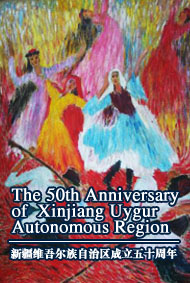|
Xinjiang,a pleasant surprise to foreigners
( 2005-09-30 )
Xinjiang has been developing quickly since China adopted the "west development" strategy in 2000 with the purpose of boosting development in its western areas, especially ethnic autonomous regions such as Tibet, Xinjiang and Ningxia.
"Xinjiang has no longer been as backward as I had thought before," said Swords.
The gross domestic product (GDP) of Xinjiang reached 220 billion yuan (27.2 billion US dollars) in 2004 from 1.2 billion yuan (148 million US dollars) in 1955, with its per-capita GDP growing to 1,383 US dollars from 30 US dollars, according to statistics from the committee.
Xinjiang is the home of 19.6 million people from 47 different ethnic groups, among whom Uygur, Han, Kazak, Hui, Mongolia and Kirgiz are the main nationalities.
The diversity of ethnic customs and cultures and well-preservednatural scenery have attracted an increasing number of domestic and foreign visitors.
Stanislav Perkin, a visitor from Israel, is deeply impressed bythe beautiful landscapes of the Halas Lake, a famous tourist destination in northern Xinjiang, and the peculiar costumes and dances of the ethic groups he saw in Kashi andTurpan.
"It is quite important to preserve the diversity of customs andcultures of different ethnic groups, which is one of the basic facets for our foreigners to know of Xinjiang," Perkin said.
According to the region's tourism administration, nearly 80 million Chinese and foreign tourists have visited Xinjiang since the region began to open to the outside world in the early 1980s.
Beside the cultural fascination, foreigners living here are also impressed by the growing national unity among the local people.
Azeem Inayat, a medical expert from Pakistan who works in Shihezi, a city about 150 kilometers west of Urumqi, said his colleagues who are of Han, Uygur and other nationalities always help and encourage each other in work, just like a big family.
Inayat, who has been working in the city for three years, said he regarded Xinjiang as the second hometown.
"I have visited many places in Xinjiang, where I see progress, development and unity," the Pakistani expert said.
"Xinjiang has great potential for development, and I believe itwill have a bright future," he said.
|

